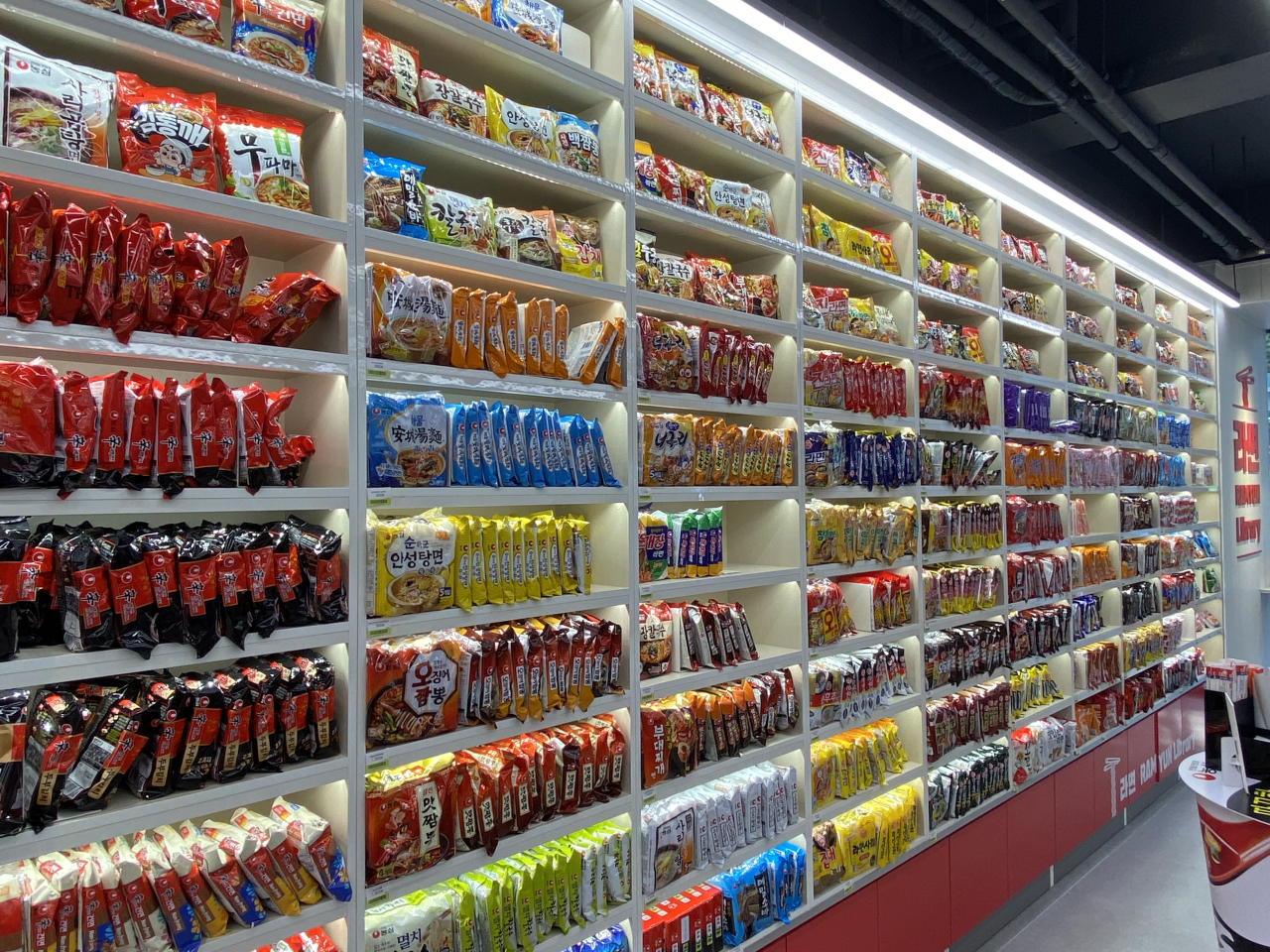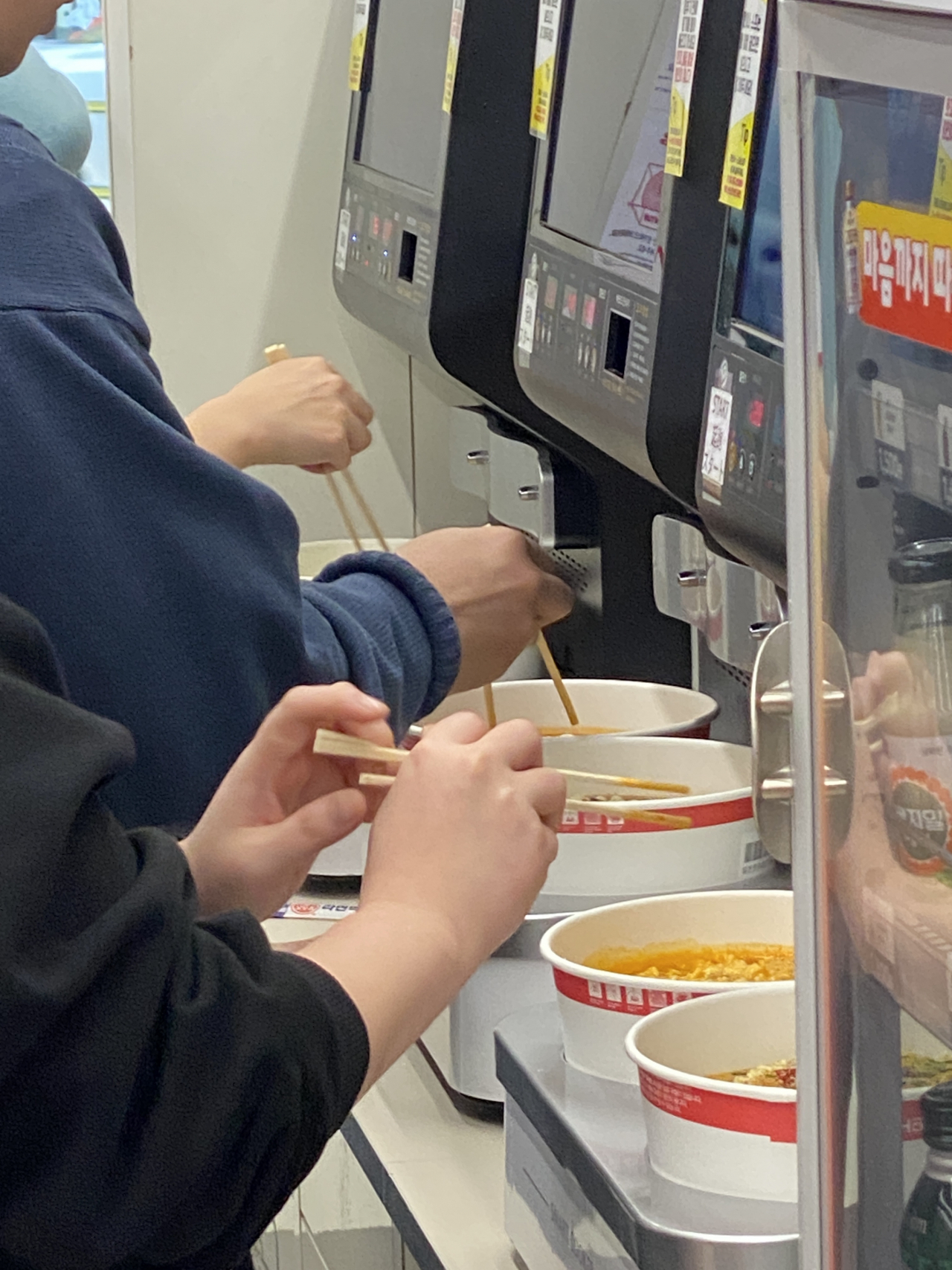 |
An array of instant noodle products is displayed at the "Ramyun Library" at CU's Hongdaesangsang branch in Mapo-gu, Seoul, Thursday. (Hwang Joo-young/The Korea Herald) |
Convenience stores have been emerging as popular lunch spots among office workers in South Korea amid the ever-rising costs of dining out, a trend many in Korea call "lunchflation."
Riding high on upbeat sales, convenience store chain CU recently launched a new store specializing in instant ramen products in the bustling Hongdae district in western Seoul.
Not only does the store offer a wide variety of ramen products, but it also has an area where customers can prepare and enjoy ramen, also known in Korea as "ramyeon."
The store's unique feature is a ramen display shelf, dubbed the "Ramyun Library,” which is 6 meters in width and 2.5 meters in height.
The store has three ramen cooking machines, capable of preparing up to six servings of instant noodles simultaneously, and ample space with tables and chairs for customers to enjoy the ramen of their choice.
Considering the price of ramen at nearby restaurants, which has almost doubled in recent years from 2,500 won ($1.90) to 4,500 won, the Hongdae branch's offer comes as a quite attractive alternative.
CU’s private label brand Heyroo’s ramen is priced at 480 won per pack, allowing customers to enjoy a packet of instant noodles for less than 2,000 won. The store’s ramen cooking machine charges 900 won -- inclusive of a disposable dish -- for cooking one serving of plastic bag-packed ramen. A raw egg, a beloved addition to ramen, is available for 300 won when purchased with the disposable plate. Even if you add side dishes such as a samgak gimbap (triangular gimbap), or an instant hamburger, the meal barely exceeds 4,000 won.
"The prices here are very advantageous compared to other lunch places. Additionally, I love that I can buy not only ramen but also desserts like bread and ice cream in one place,” said Cho Hye-jin, a 33-year-old office worker who visited the store with her office colleague.
Kim Seung-jo, a 36-year-old office worker, highlighted the store’s ample and clean space, which creates a comfortable space for him to enjoy his lunch.
"I had plastic bag-packed ramen. Unlike cup ramen, it makes me feel I’m eating a cooked meal, not instant food. The environment of the store is very suitable for cooking and savoring ramen,” Kim said.
 |
Customers cook noodles on a special machine at CU's Hongdaesangsang branch in Mapo-gu, Seoul, Thursday. (Hwang Joo-young/The Korea Herald) |
Equipping stores with instant ramen cooking machines and dining spaces is not a new strategy for CU, which has been introducing the machines since 2016. BGF Retail, the convenience store chain’s operator, explained that it decided to launch the ramen-specialized store due to the increasing sales of ramen products in recent years.
BGF Retail has observed a year-on-year increase in the sales of ramen products at its outlets nationwide, with growth of 8.6 percent in 2021, 25.6 percent in 2022, and 21.1 percent from January through November this year.
BGF Retail also said it hopes the Hongdae branch will help to formulate a positive brand impression for visitors to Korea.
"The country's convenience store businesses are now seeking globalization strategies. We wanted foreigners visiting Korea to find our stores attractive so that they would visit our overseas branches after they return to their home countries," a BGF Retail official said.
The strategic positioning of the Hongdae area, a popular destination for tourists looking to experience Korean culture, also aligns with BGF Retail's goals, the official said.
Foreign visitors like Pali, a 24-year-old Cambodian citizen who wanted to be identified by her surname, said she finds the convenience of cooking ramen in the store appealing, as there are limited cooking options for visitors staying in the country for a short time.
"I became interested in ramen after watching it being eaten in Korean dramas. Especially, my favorite Korean idol, Jungkook of BTS, got me hooked on ramen when he introduced his own special ramen recipe,” Pali said, adding, “I think it's very convenient to cook ramen at a convenience store because there aren't many places to prepare ramen for foreigners who visit the country for days like me."
BGF Retail, which operates some 17,400 CU stores in South Korea and around 510 overseas stores including 370 in Mongolia and 140 in Malaysia, plans to expand the number of its packet ramen-specialized stores if there is a growing demand.







![[Today’s K-pop] Blackpink’s Jennie, Lisa invited to Coachella as solo acts](http://res.heraldm.com/phpwas/restmb_idxmake.php?idx=644&simg=/content/image/2024/11/21/20241121050099_0.jpg)